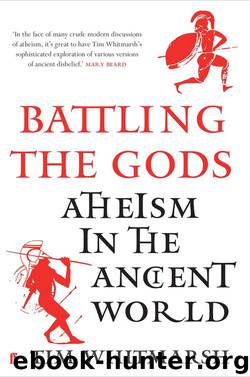Battling the Gods by Tim Whitmarsh

Author:Tim Whitmarsh [Tim Whitmarsh]
Language: eng
Format: epub
ISBN: 9780571279326
Publisher: Faber & Faber
Published: 2015-04-26T04:00:00+00:00
This is essentially the same argument as Xenophon’s: that it is contradictory both to claim that he is an atheist and to argue that he believes in the daimonion, which is a form of divinity. As in Xenophon, there is an underlying flaw in the reasoning: the daimonion may be an altogether different kind of divinity to the gods of the city. Socrates may well be a kind of atheist, if his conception of deity is so radically different from anyone else’s that no one else would recognize it as a deity at all. Meletus, at least as Plato portrays him in the ensuing exchange, was not bright enough to make that point. One modern philosopher, however, has done some of Meletus’s job for him and argued that Plato’s Socrates was indeed guilty of a kind of impiety and deservedly convicted. According to Myles Burnyeat, Socrates in the Apology can be seen to reject entirely the idea of the gods as traditionally understood, the individual gods of cult, and to replace them instead with an alternative “theology” that had but one law: humans are obliged to question the world around them, search out their own moral codes, and live by them. Socrates was famously the subject of an oracle issued by Delphi, which named him the wisest of all men. In the Apology his interpretation of this offers him a divine mandate for questioning everything that he comes across. “Men of Athens,” he says, “I respect and love you, but I shall obey the god rather than you, and as long as I have breath and strength in me, I shall never stop philosophising or exhorting you or point things out to any one of you I meet.” Significantly, for the Socrates of early Plato, this included attacking their uninterrogated beliefs about the gods. In Euthyphro, he protests that his prosecution is all down to the fact that he refuses to accept all the baroque mythological stories about the gods’ immoral behavior. This Socrates is still following in pre-Socratic footsteps, rejecting the epic conception of gods warring and cheating one another. But what is striking is that although he claims to have divine approval for his action, his program is anything but religious. It calls for no worship, no acts of devotion: the only requirement is that the individual live her or his life in the most moral way possible. Socrates himself would probably not have understood it in this way, and Plato certainly would not have done so, but to all intents and purposes this is what we would now call a humanist ethics. Do not accept inherited wisdom about anything, question everything, live only according to principles you can justify rationally: in this sense, Meletus was right about Socrates’s atheism.12
In his subsequent writings, however, Plato promotes an ever more powerful metaphysical agenda. In the dialogues of the middle period, Socrates is found proposing a new theory of “forms,” which are otherworldly, abstract distillations of all of the things that we witness with our senses in the world around us.
Download
This site does not store any files on its server. We only index and link to content provided by other sites. Please contact the content providers to delete copyright contents if any and email us, we'll remove relevant links or contents immediately.
| Anthropology | Archaeology |
| Philosophy | Politics & Government |
| Social Sciences | Sociology |
| Women's Studies |
The remains of the day by Kazuo Ishiguro(7551)
Tools of Titans by Timothy Ferriss(6945)
The Black Swan by Nassim Nicholas Taleb(6190)
Inner Engineering: A Yogi's Guide to Joy by Sadhguru(5894)
Giovanni's Room by James Baldwin(5877)
The Way of Zen by Alan W. Watts(5798)
The Six Wives Of Henry VIII (WOMEN IN HISTORY) by Fraser Antonia(4790)
The Power of Now: A Guide to Spiritual Enlightenment by Eckhart Tolle(4754)
Astrophysics for People in a Hurry by Neil DeGrasse Tyson(4620)
Asking the Right Questions: A Guide to Critical Thinking by M. Neil Browne & Stuart M. Keeley(4574)
12 Rules for Life by Jordan B. Peterson(3733)
The Ethical Slut by Janet W. Hardy(3502)
Skin in the Game by Nassim Nicholas Taleb(3459)
Housekeeping by Marilynne Robinson(3401)
The Art of Happiness by The Dalai Lama(3382)
Double Down (Diary of a Wimpy Kid Book 11) by Jeff Kinney(3272)
Skin in the Game: Hidden Asymmetries in Daily Life by Nassim Nicholas Taleb(3264)
Walking by Henry David Thoreau(3234)
12 Rules for Life: An Antidote to Chaos by Jordan B. Peterson(3200)
